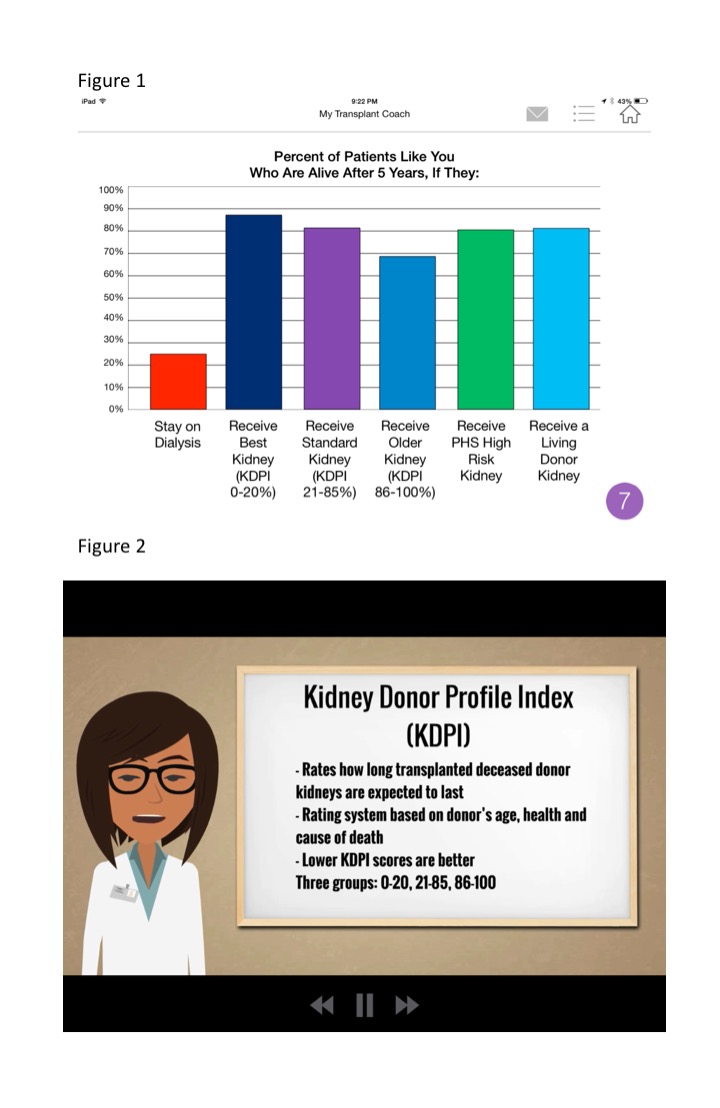Cultural Competency of a Mobile, Customized Patient Education Tool for Improving Potential Kidney Transplant Recipients' Knowledge and Decision-Making.
1Surgery, East Carolina University, Greenville, NC
2Medicine, UCLA, Los Angeles, CA
3Medicine, Massachusetts General Hospital, Boston, MA
4Transplant, Saint Louis University, St. Louis, MO
Meeting: 2017 American Transplant Congress
Abstract number: 505
Keywords: Allocation, Kidney transplantation, Patient education
Session Information
Session Name: Concurrent Session: Economics and Outcomes in Organ Transplantation
Session Type: Concurrent Session
Date: Tuesday, May 2, 2017
Session Time: 4:30pm-6:00pm
 Presentation Time: 5:06pm-5:18pm
Presentation Time: 5:06pm-5:18pm
Location: E271a
Patients with ESRD face a complex array of treatment options as a result of the revised kidney allocation system. Decision aids improve patient care through the provision of relevant, individualized clinical information. To assist patients and clinicians in evaluating transplant treatment options, a mobile iOS-based application, My Transplant Coach (MTC), was developed to compare individualized, risk adjusted survival expectations with dialysis, living donor transplant, or deceased donor transplant (DDKT). DDKT outcomes account for waitlist mortality adjusted for expected time to DDKT in the patient's donation service area. Post-DDKT survival expectations based on willingness to accept DDKTs with varying characteristics are also provided. [Figure 1] Outcome data are embedded within animated education programs to explain the treatment outcomes and interpret survival graphs [Figure 2] The MTC app was piloted in 2 large US transplant programs with a diverse group of transplant candidates (N=81): 26% African American, 27% Caucasian, 15% Hispanic, 25% Asian. The majority (86%) felt that the MTC helped them learn about their treatment options and was culturally appropriate for their race/ethnicity (67%-85%). Patients improved significantly on a 20-point test of transplant knowledge (9.1/20 to 13.8/20 p<.0001) after viewing the MTC, including patients with low health literacy (8 to 13 p<.0001). Patients demonstrated an improved understanding of the impact of donor source on outcomes, use of the KPDI score, and benefits of transplant compared with dialysis (p<.05 for all). Overall interest in living donation increased; however, interest in non-standard DDKT did not (p>.05). This pilot project confirmed the benefit and cultural acceptability of the MTC educational tool and further refinement will explore how to better communicate the risks and benefits of non-standard donors.
The MTC app was piloted in 2 large US transplant programs with a diverse group of transplant candidates (N=81): 26% African American, 27% Caucasian, 15% Hispanic, 25% Asian. The majority (86%) felt that the MTC helped them learn about their treatment options and was culturally appropriate for their race/ethnicity (67%-85%). Patients improved significantly on a 20-point test of transplant knowledge (9.1/20 to 13.8/20 p<.0001) after viewing the MTC, including patients with low health literacy (8 to 13 p<.0001). Patients demonstrated an improved understanding of the impact of donor source on outcomes, use of the KPDI score, and benefits of transplant compared with dialysis (p<.05 for all). Overall interest in living donation increased; however, interest in non-standard DDKT did not (p>.05). This pilot project confirmed the benefit and cultural acceptability of the MTC educational tool and further refinement will explore how to better communicate the risks and benefits of non-standard donors.
CITATION INFORMATION: Axelrod D, Kynard-Amerson C, Wojciechowski D, Lentine K, Schnitzler M, Peipert J, Waterman A. Cultural Competency of a Mobile, Customized Patient Education Tool for Improving Potential Kidney Transplant Recipients' Knowledge and Decision-Making. Am J Transplant. 2017;17 (suppl 3).
To cite this abstract in AMA style:
Axelrod D, Kynard-Amerson C, Wojciechowski D, Lentine K, Schnitzler M, Peipert J, Waterman A. Cultural Competency of a Mobile, Customized Patient Education Tool for Improving Potential Kidney Transplant Recipients' Knowledge and Decision-Making. [abstract]. Am J Transplant. 2017; 17 (suppl 3). https://atcmeetingabstracts.com/abstract/cultural-competency-of-a-mobile-customized-patient-education-tool-for-improving-potential-kidney-transplant-recipients-knowledge-and-decision-making/. Accessed March 4, 2026.« Back to 2017 American Transplant Congress
